Key takeaways:
- Urban telematics networks enhance city operations by using technology to optimize transportation and urban services, improving daily life for residents.
- Participation in tech workshops bridges the gap between theory and practical application, fostering innovation through diverse perspectives and hands-on experiences.
- Key concepts such as real-time data collection, the Internet of Things (IoT), and Geographic Information Systems (GIS) are crucial for effective urban management and improving community services.
- Networking opportunities at workshops enable meaningful connections and collaborations, enhancing personal growth and professional relationships in the urban technology space.
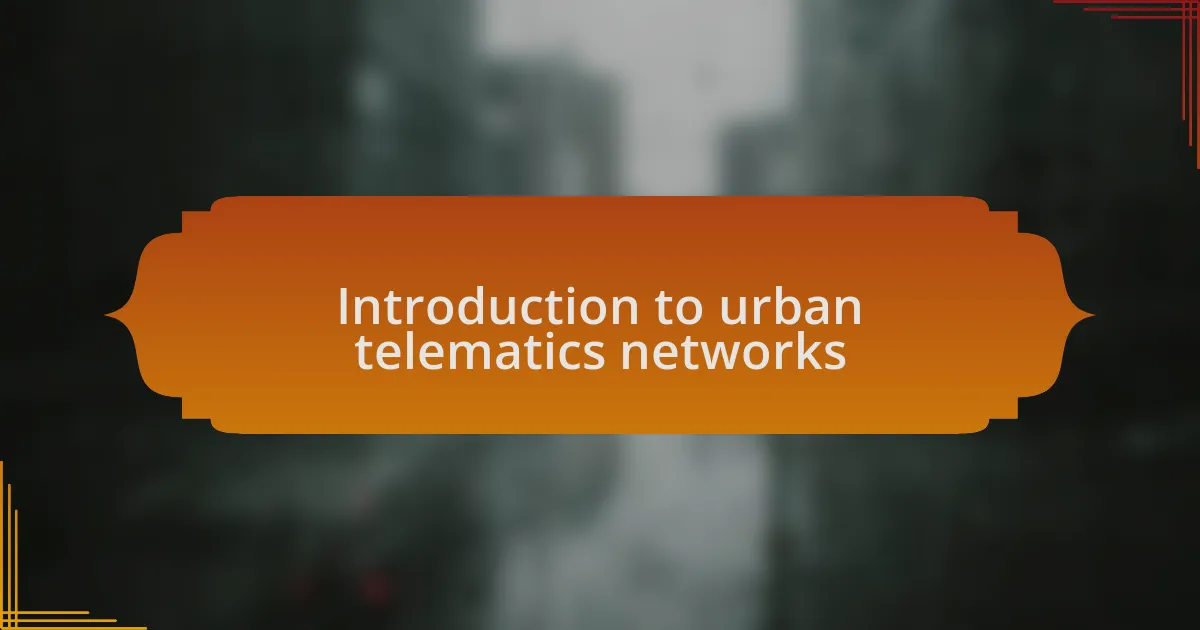
Introduction to urban telematics networks
Urban telematics networks are transforming how cities operate and connect with their inhabitants. These networks leverage technology to collect, analyze, and disseminate data related to transportation, infrastructure, and urban services, creating a seamless flow of information. I often find myself pondering how these systems can enhance our daily lives—can we truly imagine a future where traffic jams are a thing of the past, thanks to real-time data?
During my time exploring different tech workshops, I’ve witnessed firsthand the potential of urban telematics. For instance, hearing about a city’s initiative to integrate real-time public transit updates made me realize how such advancements could reduce our commuting anxieties. It’s exhilarating to think that with the right tools, cities can optimize resources more efficiently and make urban living a more pleasant experience.
Moreover, the beauty of urban telematics lies in its collaborative spirit. When city officials, tech experts, and citizens come together around a common goal, the possibilities are endless. I’ve seen community engagement efforts spark innovations in smart lighting and waste management, making me wonder: what else could we achieve if we harness collective knowledge and creativity?
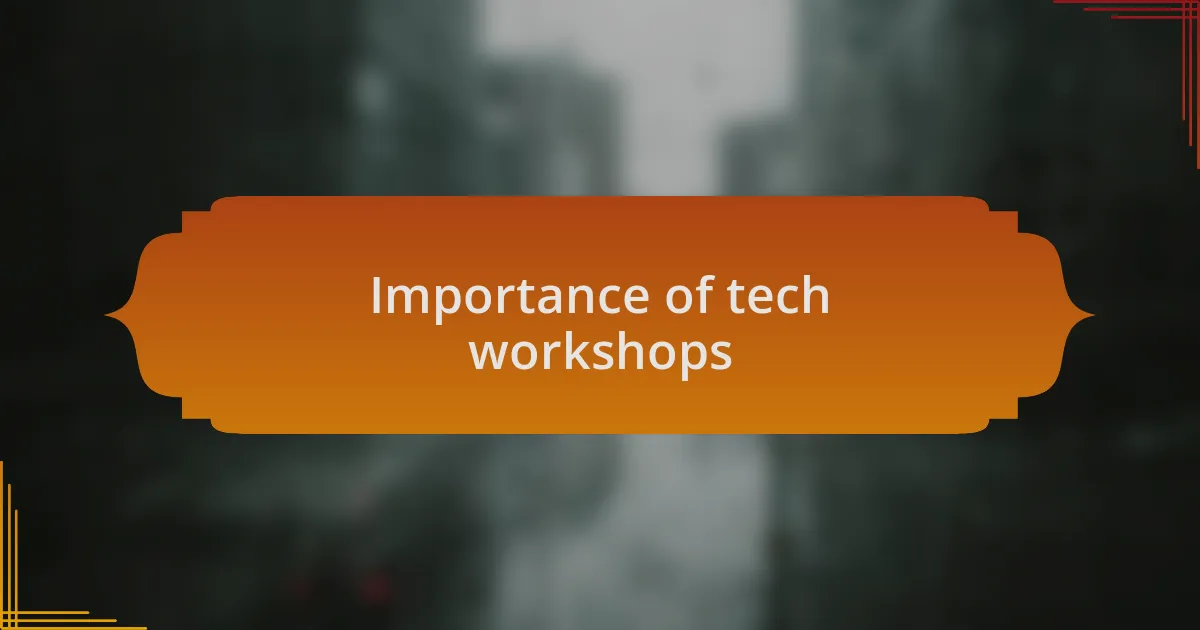
Importance of tech workshops
Tech workshops play a crucial role in bridging the gap between theory and practice. I vividly remember attending a session focused on data visualization tools for urban planning—a moment that shifted my perspective on how raw data transforms into impactful narratives. It left me wondering: can we truly grasp the intricacies of urban challenges without these practical tools?
Furthermore, these workshops foster an environment where innovation thrives. I’ve seen participants from diverse backgrounds come together, sharing unique perspectives and sparking ideas I hadn’t considered before. For example, after discussing pedestrian safety technologies, a passionate conversation erupted about integrating local art with smart infrastructure—it left me inspired by how creativity can define technology.
Lastly, staying updated with current trends is indispensable in our fast-paced tech landscape. Each workshop I’ve attended has equipped me with insights that directly influence my understanding of urban telematics. How can we address ongoing urban issues without constant learning and adaptation? For me, it’s clear: engaging in these educational experiences isn’t just beneficial; it’s essential for driving progress in our cities.
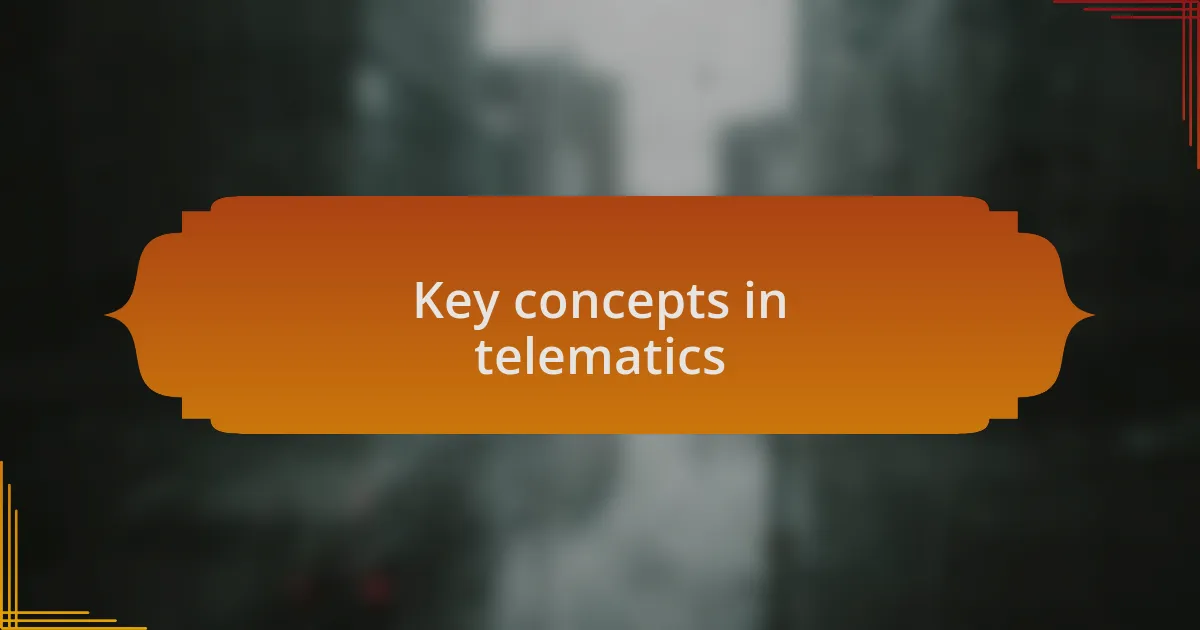
Key concepts in telematics
Understanding key concepts in telematics is fundamental to leveraging its benefits in urban environments. A standout moment for me was during a workshop on real-time data collection techniques. The speaker shared compelling examples of how traffic flow data can dynamically adjust traffic lights, improving both congestion and air quality. It made me realize how powerful data can be when used effectively—are we fully capitalizing on such resources in our own cities?
One essential concept that often comes up is the Internet of Things (IoT) and its role in telematics. I remember a particularly enlightening discussion where a participant shared their experience with smart sensors in public transportation. It struck me how these sensors not only provide valuable insights to city planners but also foster real-time communication with commuters. Could this dual benefit be the key to enhancing user experience while optimizing services?
Another concept is the integration of Geographic Information Systems (GIS) within telematics. I found it fascinating when we examined a case study illustrating how GIS mapping helped reduce response times for emergency services. This discussion left me contemplating how critical it is for cities to adopt such technologies—how else can we ensure that every second counts in emergency situations? By embracing these key concepts, we can truly enhance the connectivity and efficiency of our urban environments.
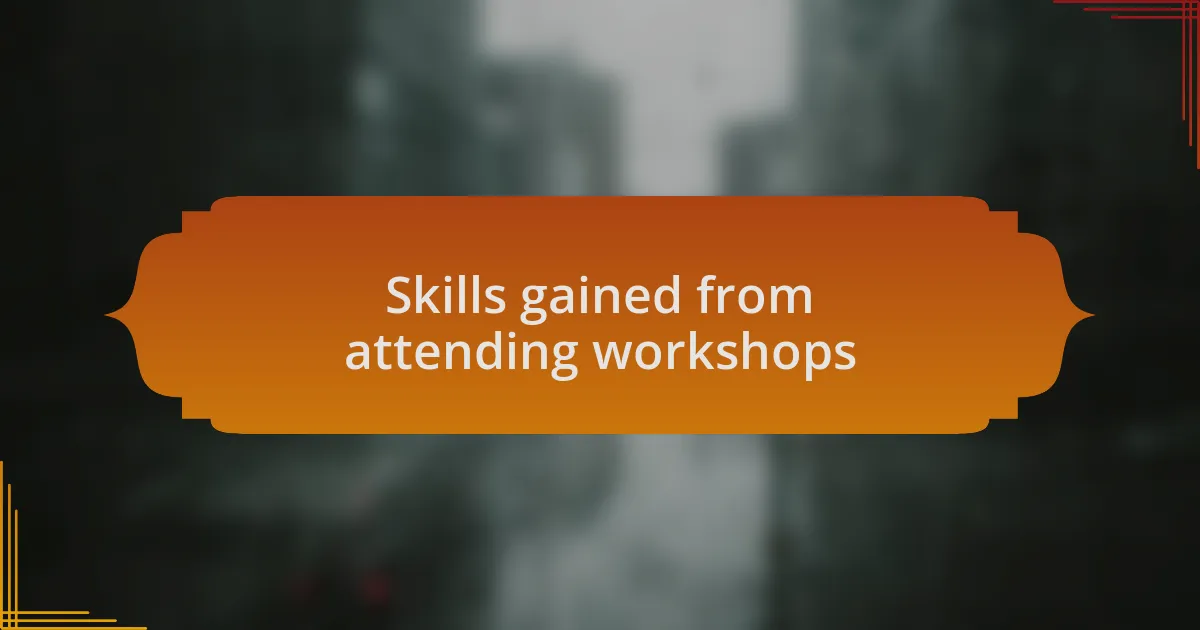
Skills gained from attending workshops
Attending workshops has significantly broadened my skill set, particularly in hands-on data analysis techniques. During one session, I grappled with actual datasets, learning how to extract actionable insights from raw information. It was intriguing to see how analytics plays a crucial role in decision-making—how often do we overlook the importance of numbers in developing urban solutions?
One illuminating experience involved working on a group project that focused on urban mobility. Collaborating with others from different backgrounds allowed me to appreciate diverse perspectives on problem-solving. I began to understand how effective teamwork can lead to innovative solutions—can our varied experiences truly be the catalyst for transformative change in our cities?
Additionally, I honed my technical skills in software commonly used in telematics. Learning to navigate these tools felt empowering; I realized that knowing the right technologies can open countless doors. Have you ever experienced that “aha” moment when a complex process suddenly clicks? It’s exhilarating, and that’s what keeps me eager to learn more in this ever-evolving field.
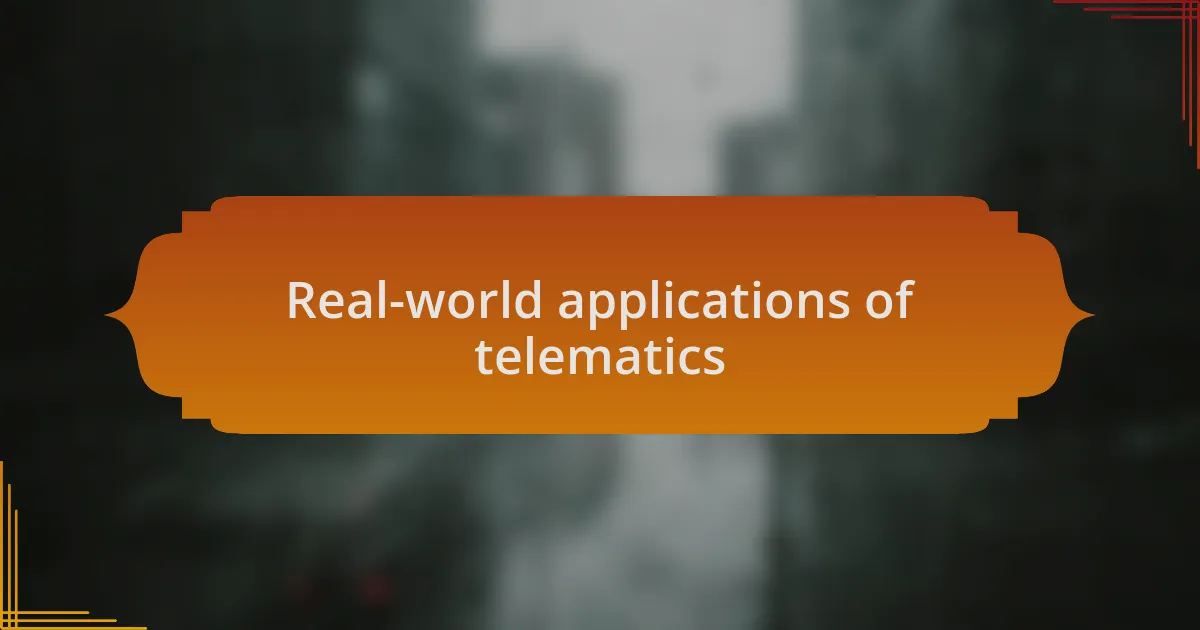
Real-world applications of telematics
Real-world applications of telematics stretch across various sectors, providing impactful solutions to urban challenges. For instance, in transportation, telematics allows cities to monitor traffic patterns in real time, leading to better congestion management. I remember a discussion during a workshop where we analyzed data from smart traffic signals—how fascinating it was to see correlations between weather conditions and traffic flow!
In public safety, telematics is invaluable for fleet management. During a workshop exercise, we explored how emergency services could optimize their response times using location data from vehicles. It hit me—how can we leverage real-time data to save lives? This kind of technology not only improves efficiency but also enhances community safety, emphasizing the importance of integrating telematics in everyday urban management.
Moreover, telematics plays a critical role in environmental monitoring. I participated in a group analysis where we examined data from connected sensors to track air quality levels. I found it eye-opening to connect the dots between urban infrastructure and environmental health. How often do we forget the relationship between our cities and the air we breathe? This connection underscores the real-world significance of telematics in creating sustainable urban environments.
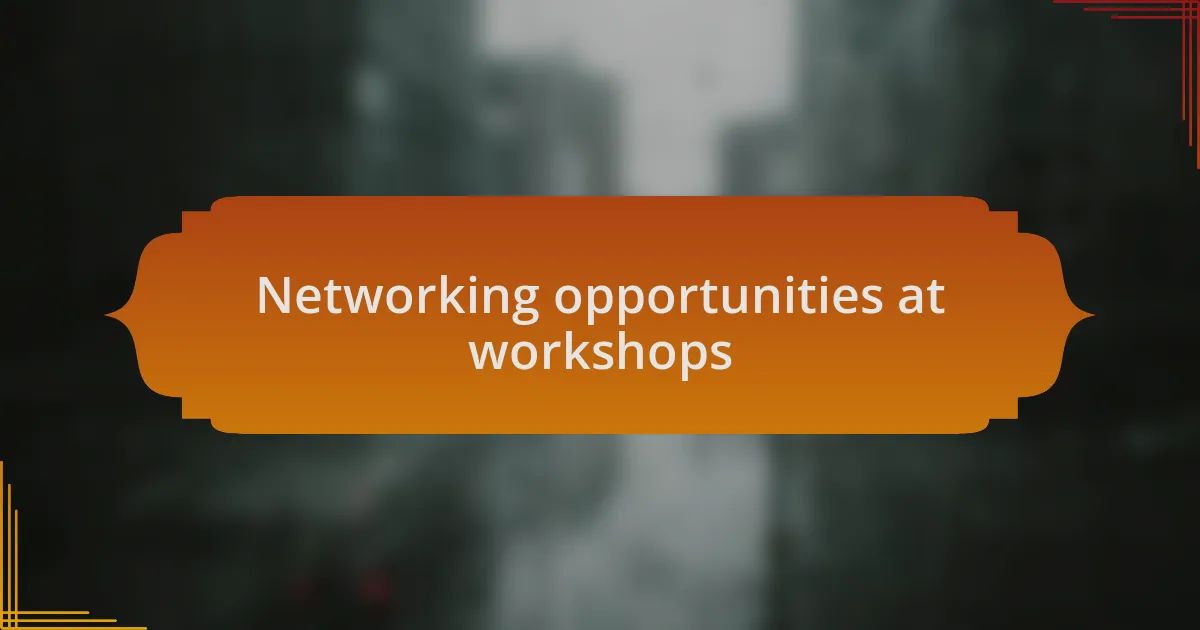
Networking opportunities at workshops
Attending tech workshops presents a unique opportunity to connect with like-minded individuals who share a passion for innovation. I recall one workshop where I struck up a conversation with a fellow attendee who was developing a smart city application. We ended up brainstorming ideas together, and it sparked a collaboration that has truly enriched my understanding of urban technology. How often do we get the chance to meet someone who can challenge our thinking in such an engaging environment?
The informal setting of workshops fosters genuine connections that often lead to lasting professional relationships. In one session, I found myself at a lunch table filled with industry experts and budding entrepreneurs. As we exchanged stories, it became evident that every person brought something valuable to the table—different experiences, challenges, and solutions. Isn’t it energizing to be in a space where everyone is keen to share their knowledge?
Moreover, many workshops encourage networking through structured activities, which can feel intimidating but ultimately rewarding. I remember participating in a speed networking event, where I had just minutes to pitch my ideas to various professionals. It was nerve-wracking, yet exhilarating, and I walked away with several meaningful connections. Could stepping out of our comfort zones be the key to unlocking new opportunities in our careers? Ultimately, these workshops serve as a catalyst for networking, fueling both personal growth and professional connections.
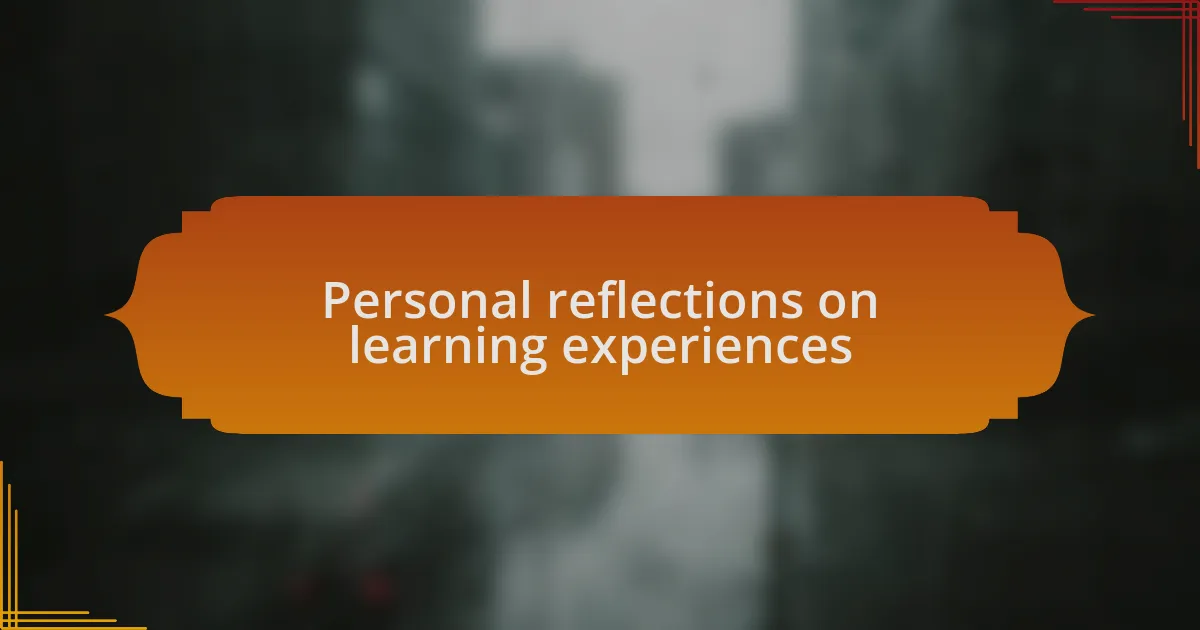
Personal reflections on learning experiences
Engaging in tech workshops has profoundly influenced my approach to learning. I vividly remember a session focused on data analytics for urban design, where a challenging hands-on activity pushed me to think critically about how data shapes our cities. That moment made me realize that learning isn’t just about absorbing information; it’s about actively applying concepts and reflecting on the outcomes. Have you ever noticed how hands-on experiences can really deepen your understanding of a subject?
One particularly striking experience for me was participating in a group project where we reimagined public spaces using telematics. The diversity of thought among my peers enriched the entire process. Witnessing how different perspectives can unite to solve complex urban issues made me appreciate the collaborative spirit inherent in these workshops. It’s fascinating how shared goals can transform interactions into a powerful learning experience.
Looking back, I can see that the discomfort of navigating unfamiliar topics often leads to the most significant learning breakthroughs. There was a moment when I felt completely overwhelmed during a discussion on emerging technologies. However, that frustration fueled my determination to ask questions and seek clarity. I learned that vulnerability in learning is a strength, not a weakness. Isn’t it remarkable how acknowledging what we don’t know can actually open doors to deeper insights?